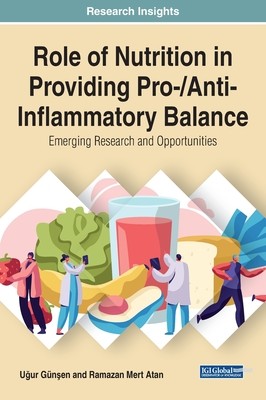
- We will send in 10–14 business days.
- Publisher: Medical Information Science Reference
- ISBN-10: 1799835944
- ISBN-13: 9781799835943
- Format: 17.8 x 25.4 x 1.4 cm, kieti viršeliai
- Language: English
- SAVE -10% with code: EXTRA
Role of Nutrition in Providing Pro-/Anti-Inflammatory Balance: Emerging Research and Opportunities (e-book) (used book) | bookbook.eu
Reviews
Description
Food selection plays an important role in ensuring pro- and anti-inflammatory balance. Certain foods are responsible for increasing inflammation while others have anti-inflammation properties. Western diets especially, rich in red meat, simple carbohydrates, and refined grains, increase the levels of pro-inflammatory markers, C-reactive protein (CRP), and interleukin-6 (IL-6). Additionally, short- and long-chain fatty acids, various micronutrients including zinc, selenium, iron, vitamin A, probiotics, and prebiotic foods affect inflammation. As inflammation can be linked to a variety of diseases, more studies are needed about nutrition and its ability to prevent inflammation. Role of Nutrition in Providing Pro-/Anti-Inflammatory Balance: Emerging Research and Opportunities is an essential publication that examines balancing inflammation through nutrition and nutritional strategies. Firstly, information about the formation process of inflammation, biomarkers used for diagnosis, diseases affected by inflammation, and their incidence in society are discussed. Subsequently, balancing inflammation in individuals through macro- and micro-nutrient consumption, nutritional supplements (probiotics and prebiotics), bioactive proteins and peptides, and dietary forms is examined. Featuring research covering a broad range of topics including food supplements, diet types, and bioactive proteins, this book is ideally designed for nutritionists, dieticians, clinicians, doctors, nurses, healthcare providers, researchers, academicians, and students.
EXTRA 10 % discount with code: EXTRA
The promotion ends in 22d.20:11:08
The discount code is valid when purchasing from 10 €. Discounts do not stack.
- Publisher: Medical Information Science Reference
- ISBN-10: 1799835944
- ISBN-13: 9781799835943
- Format: 17.8 x 25.4 x 1.4 cm, kieti viršeliai
- Language: English English
Food selection plays an important role in ensuring pro- and anti-inflammatory balance. Certain foods are responsible for increasing inflammation while others have anti-inflammation properties. Western diets especially, rich in red meat, simple carbohydrates, and refined grains, increase the levels of pro-inflammatory markers, C-reactive protein (CRP), and interleukin-6 (IL-6). Additionally, short- and long-chain fatty acids, various micronutrients including zinc, selenium, iron, vitamin A, probiotics, and prebiotic foods affect inflammation. As inflammation can be linked to a variety of diseases, more studies are needed about nutrition and its ability to prevent inflammation. Role of Nutrition in Providing Pro-/Anti-Inflammatory Balance: Emerging Research and Opportunities is an essential publication that examines balancing inflammation through nutrition and nutritional strategies. Firstly, information about the formation process of inflammation, biomarkers used for diagnosis, diseases affected by inflammation, and their incidence in society are discussed. Subsequently, balancing inflammation in individuals through macro- and micro-nutrient consumption, nutritional supplements (probiotics and prebiotics), bioactive proteins and peptides, and dietary forms is examined. Featuring research covering a broad range of topics including food supplements, diet types, and bioactive proteins, this book is ideally designed for nutritionists, dieticians, clinicians, doctors, nurses, healthcare providers, researchers, academicians, and students.


Reviews